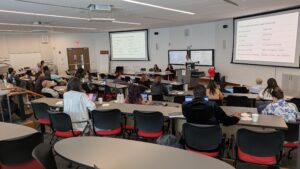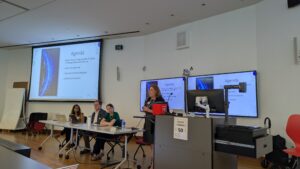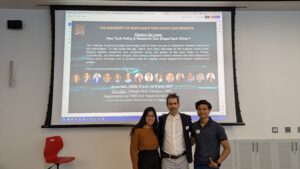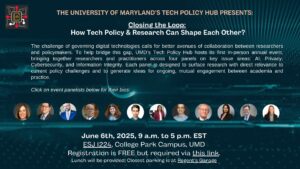The Tech Policy Hub met on Friday, June 6th 2025, for its first annual event, to discuss four pressing tech policy topics between scholars and government practitioners. We surveyed the cybersecurity, consumer privacy, AI, and information integrity domains and crystallized findings on how to build the bridge between tech policy research and practice.
We discussed the key role of *policy entrepreneurs* from within the government, who can push and inform the policy process based on research findings. We mentioned how there is never really a policy vacuum – if the federal government is not involved, states, markets, or other global powers jump in to shape the tech policy space. And these kinds of interventions tend to have their own costs. We mentioned how US states for instance, who are becoming increasingly involved in tech policy, do not have a NIST, a state department, or significant international influence.
the key role of *policy entrepreneurs* from within the government, who can push and inform the policy process based on research findings. We mentioned how there is never really a policy vacuum – if the federal government is not involved, states, markets, or other global powers jump in to shape the tech policy space. And these kinds of interventions tend to have their own costs. We mentioned how US states for instance, who are becoming increasingly involved in tech policy, do not have a NIST, a state department, or significant international influence.
We realized that we need to pay attention to small / medium businesses, organizations, such as government counties, that often struggle with resources and could use the help of researchers and the attention from regulators.
A successful bridge between tech policy research and practice is also a language challenge – how do we make sure to translate research findings for policymakers? Make them digestible, actionable, and useful for practitioners through blog posts, op-eds, and make sure to tell the story of the research in a coherent way.
Researchers need to ‘educate’ policymakers as much as they can – what are the burning debates in the field? What is the standard of evidence in the field? At the same time, researchers can learn from legislatures and regulators – what are the concrete topics on the agenda? What is required to make a change?
Policy questions are complex, difficult, with various dimensions. Research (scientific) questions tend to be more focused. Bridging the two is a great challenge.
How do we create incentives for academics to make an im pact in the tech policy field? Tenure is mostly decided based on the quality of research rather than its impact. Can we build incentives structures, maybe for tenured faculty, to actively advance tech policy cycle?
pact in the tech policy field? Tenure is mostly decided based on the quality of research rather than its impact. Can we build incentives structures, maybe for tenured faculty, to actively advance tech policy cycle?
Importantly, academics (usually) do not have a political agenda, they can be neutral and uniquely contribute to policy discussions over their topics of expertise – how do we create incentives for policymakers to take in academic advice in their design and enforcement of tech regulations?
As researchers, we should engage with relevant stakeholders early on – get their feedback and understand how they can use our research. It is important to recognize the sectors and the people that need to act based on research findings.
![]()
![]()



